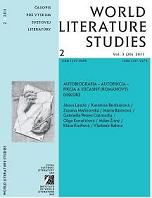K zástoju autobiografickosti a sebainscenácie v diele Hansa Christiana Andersena
ON THE ROLE OF AUTOFICTION AND SELF-INSCENATION IN THE WORK OF HANS CHRISTIAN ANDERSEN
Author(s): Milan ŽitnýSubject(s): Literary Texts
Published by: Ústav svetovej literatúry, Slovenská akadémia vied
Keywords: Autofiction. Self-inscenation. Autobiographical contract. Authorial marketing strategy. Reception of Andersen’s autobiographical works in Slovakia.
Summary/Abstract: Hans Christian Andersen, a significant representative of the 19th century Danish literature, is one of the authors, who deliberately used autobiographical elements in their key works. Besides writing novels, plays and fairy-tales, he concurrently commented on his work and life, offering the reader a suggestive autofiction and daring self-inscenation in numerous autobiographical books of memoirs and travelogues. In Europe, they worked mostly as a very effective authorial marketing strategy, but also raise questions concerning his way of displaying personal qualities, dispositions and preferences (relationship to his mother, relationship to women, the supposed inclination toward homosexuality, etc.). The study discusses the topic on the basis of Andersen’s autobiographical works and in the context of the then Scandinavian and German literatures. The author relates to foreign, as well as domestic works focusing at H. Ch. Andersen (J. Andersen, N. Kofoed, N. Philip, S. Hakon Rossel, Z. Klátik, J. Kaňa, and others), and he critically outlines the complexity of the relationship between the image of self and fiction, the latter substituting reality, resp. unfulfilled life visions and dreams of the important author of the 19th century. The study also includes comparative analyses of autobiographical texts, diaries and letters (if available).
Journal: World Literature Studies
- Issue Year: III/2011
- Issue No: 2
- Page Range: 82-95
- Page Count: 14
- Language: Slovak

